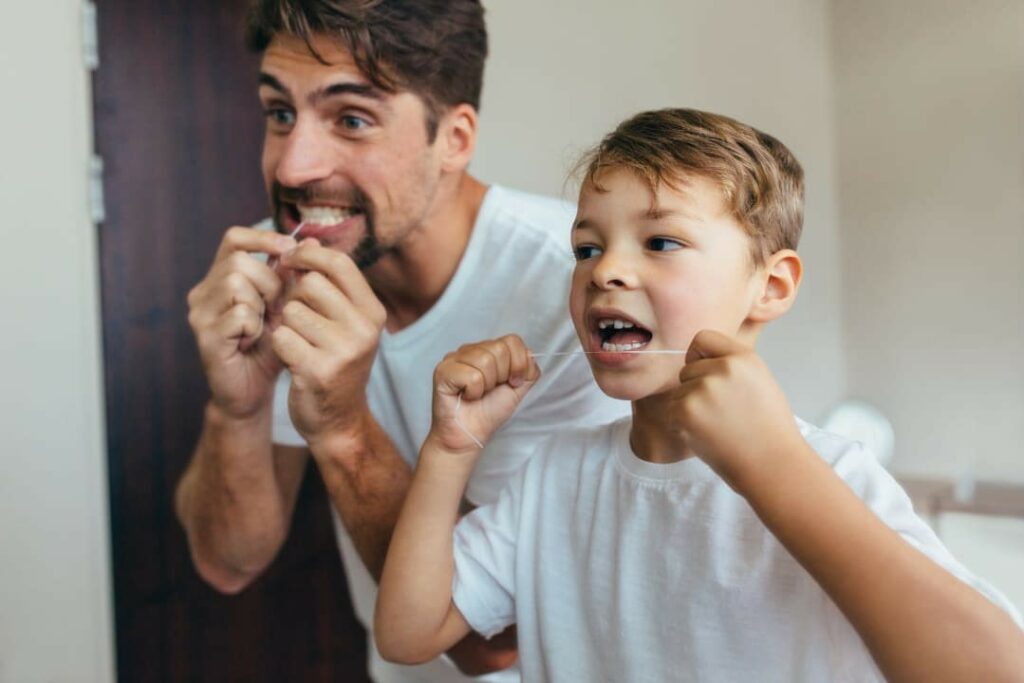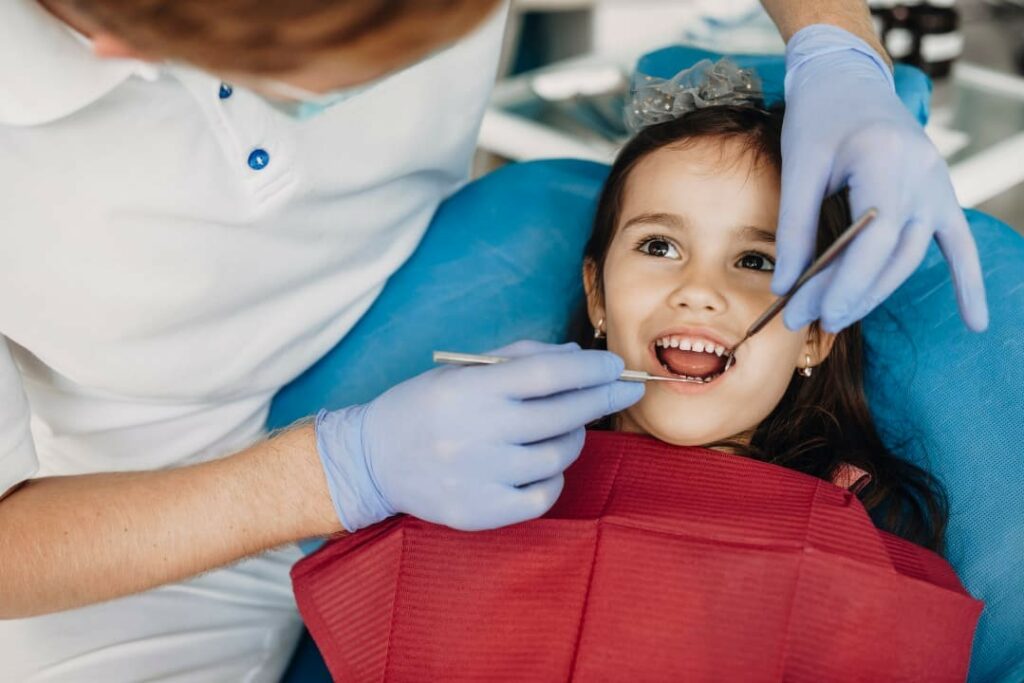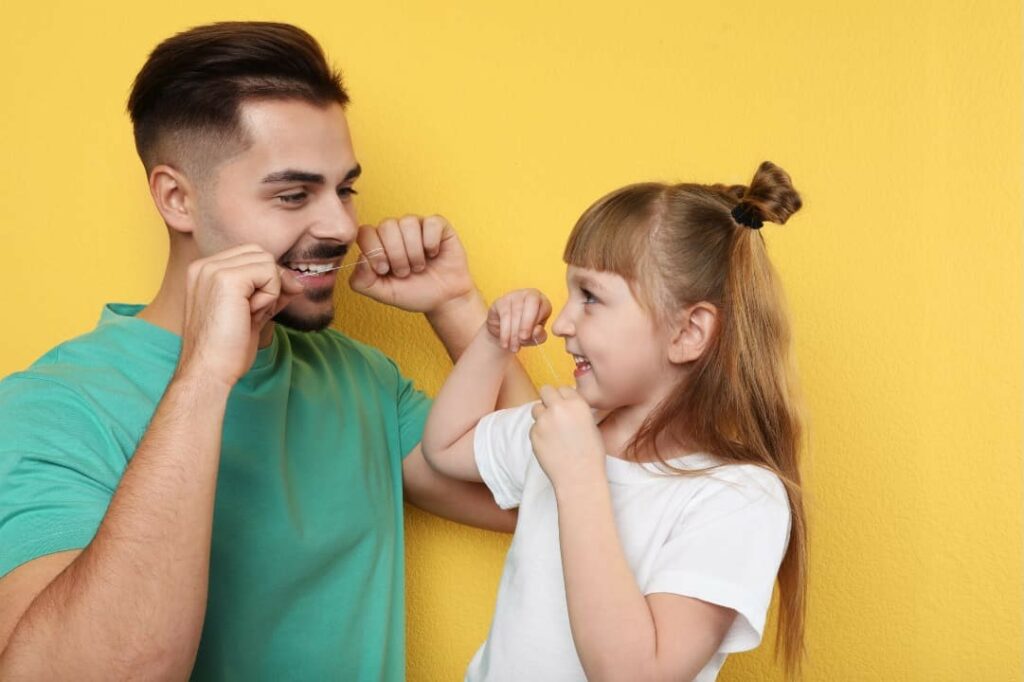Flossing is one of the most important oral hygiene practices you can teach your child. If you want your child to have healthy teeth and a healthy smile, you can’t overlook the importance of flossing.
We sometimes get a question from parents about whether their kids should be flossing before or after brushing their teeth. It’s a great question!
Of course, we love to see kids flossing their teeth every day, regardless of whether they do it before or after they brush their teeth. That said, there are benefits to flossing first and brushing second.
The most important thing is for kids to brush their teeth and floss regularly. Whether they floss then brush, or brush then floss, this healthy habit is going to help both today and in the long term.

Should Kids Floss Before Brushing Their Teeth?
Most people tend to brush first, then floss.
It’s hard to say where this pattern started, but perhaps it is because it seems sensible to brush your teeth to get rid of any debris and food particles from your mouth first. Then, after your teeth are clean, you can floss those tight, harder-to-reach areas.
However, research has shown that brushing after flossing has more health benefits than the other way around.
We know that flossing can dislodge food particles from where they are stuck between teeth. If you have already brushed your teeth and then you floss, those debris just stay in your mouth until the next time you brush.
Bacterial growth overnight is one of the leading causes of cavities, so it is important for kids to have the cleanest mouth possible at bedtime.
It is more important to floss daily than to worry about whether flossing or brushing comes first.
The Importance of Flossing
Why is flossing so important, anyway?
Here’s a list of some of the biggest benefits of developing a daily flossing routine:
- Flossing removes plaque.
- It reduces bad breath by eliminating the bacteria that causes it.
- It reduces the amount of bacteria hiding in the gaps between your teeth that brushing can’t reach.
- Flossing reduces your child’s risk of developing cavities.
- It keeps your gums healthy and reduces soreness, puffiness, and redness.
- Flossing can reduce tartar, which discolors your child’s smile.
- By helping your child take care of their teeth now through flossing, you are saving yourself costly procedures in the future.
- Good flossing habits can also help your child avoid invasive and stressful dental procedures later.
- Flossing helps to prevent gingivitis, which in turn helps to prevent the development of periodontitis.
We don’t think it’s possible to emphasize this enough: kids need to floss their teeth!

How often should your child floss?
Children should floss their teeth every day before bed as part of a regular dental hygiene routine.
While children are young, they will need help with flossing. They can eventually learn to floss on their own, but most young kids will need some help for the first several years of flossing.
When parents help children develop this habit early, it will benefit them throughout their entire lives.
At what age should kids start to floss?
You don’t need to floss at the first sight of a baby tooth — or even a few baby teeth.
Rather, you should start flossing when your child’s teeth get closer together and start to touch; this usually happens between the ages of 2 and 6.
Tips for Getting Kids to Floss
Okay, so let’s say that we have convinced you about the importance of flossing. The next question is: how do we get kids to actually floss?
Many of the creative ways for getting your kids to brush their teeth apply to flossing, too!
For example, you can use one of the following methods:
- Start at an early age so that it is an accepted part of the bedtime routine.
- If a kid is hesitant to let you floss, make it fun with games, songs, or dancing.
- Offer rewards for good flossing and brushing habits (not candy or sugary foods, though, please!)
- Get them involved by giving them choices about what kind of toothbrush, toothpaste, and floss to use.
How to floss a child’s teeth
There are two standard methods for flossing a child’s teeth: the spool method and the loop method.
The spool method (AKA: the finger-wrap method) goes like this:
- Choose floss that works best for you. Options include waxed and unwaxed, flavored and unflavored, textured and smooth, and wide or regular-width.
- Cut an 18- to 20-inch length of floss.
- Wrap each end of the floss multiple times around your two middle fingers or index fingers.
- Carefully slide the floss in between two of your child’s teeth. If the floss is around your middle fingers, use your index fingers to guide the floss. If you wrap your index fingers, then your thumbs can be the guide.
- Use an up-and-down motion to clean out the space between these two teeth.
- Last but not least, bend the floss to form a “c” shape around each side of the tooth.
- Repeat for each of your child’s teeth.
Here are the instructions for the loop (or circle) method:
- Just like before, cut about 18 to 20 inches of your chosen type of floss.
- Tie the floss into a circle that you can fit your four fingers (not your thumb) into.
- Place your four fingers into the loop, and use your index finger and thumb to thread the floss between your child’s teeth and move it up and down.
- Repeat between each tooth, and don’t forget to form a “c” shape in order to get the sides of each tooth.

What about flossing picks?
Parents often have questions about flossing picks, which may also be called flossing sticks.
This handy, disposable tool has one end that you hold onto, and another end with a small piece of floss stretched between two pieces of plastic. Kids have small mouths, and sometimes it can be difficult for their trusted grown-ups to reach those molars.
That’s where a flossing pick comes into play!
You can reach further and easier with a flossing pick. It’s also a good tool for teaching kids to floss on their own, because these picks are easier to use than traditional floss.
To use a flossing stick, follow these simple instructions:
- Use a new flossing pick for each flossing session.
- Hold the handle and place the floss between two of your child’s teeth.
- Gently move the flossing stick both up and down and side-to-side to remove debris and food particles.
- You can rinse the flossing pick as often as necessary during the flossing session.
What’s More Important Than Flossing Before or After Brushing?
When building good dental hygiene habits with your kids, the most important thing to do is to make flossing a part of your routine.
Although there may be some benefits to flossing first and brushing second, the most important thing is that flossing happens at all!
Ashburn Children’s Dentistry Helps Kids Keep Their Healthy Smiles
At Ashburn, our team believes in taking a holistic and compassionate approach to pediatric dental care. We know that going to the dentist can be scary for some kids, especially if they have had any negative experiences elsewhere.
We are committed to making your child’s experience at the dentist’s office fun, pleasant, and stress-free!
Call our office today to set up an appointment for your child.



